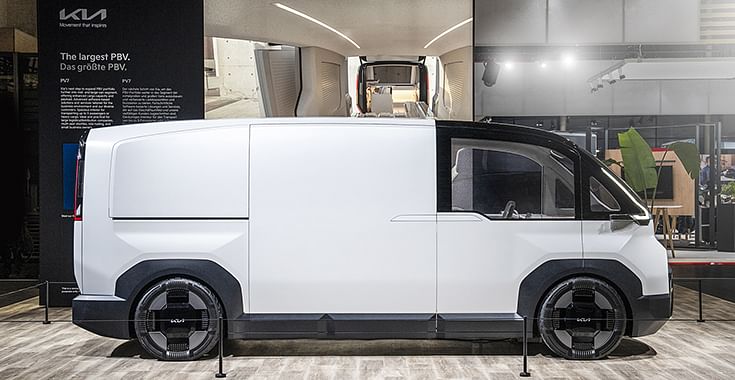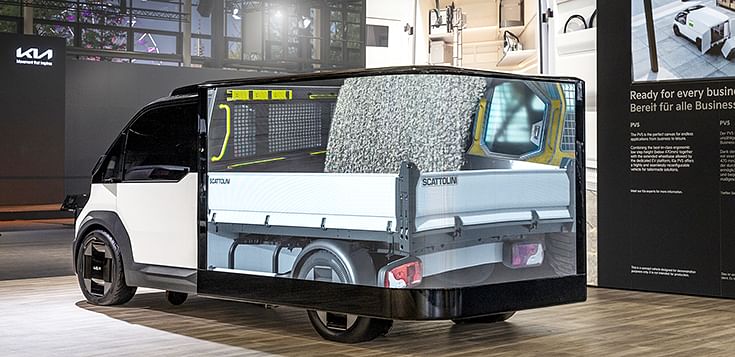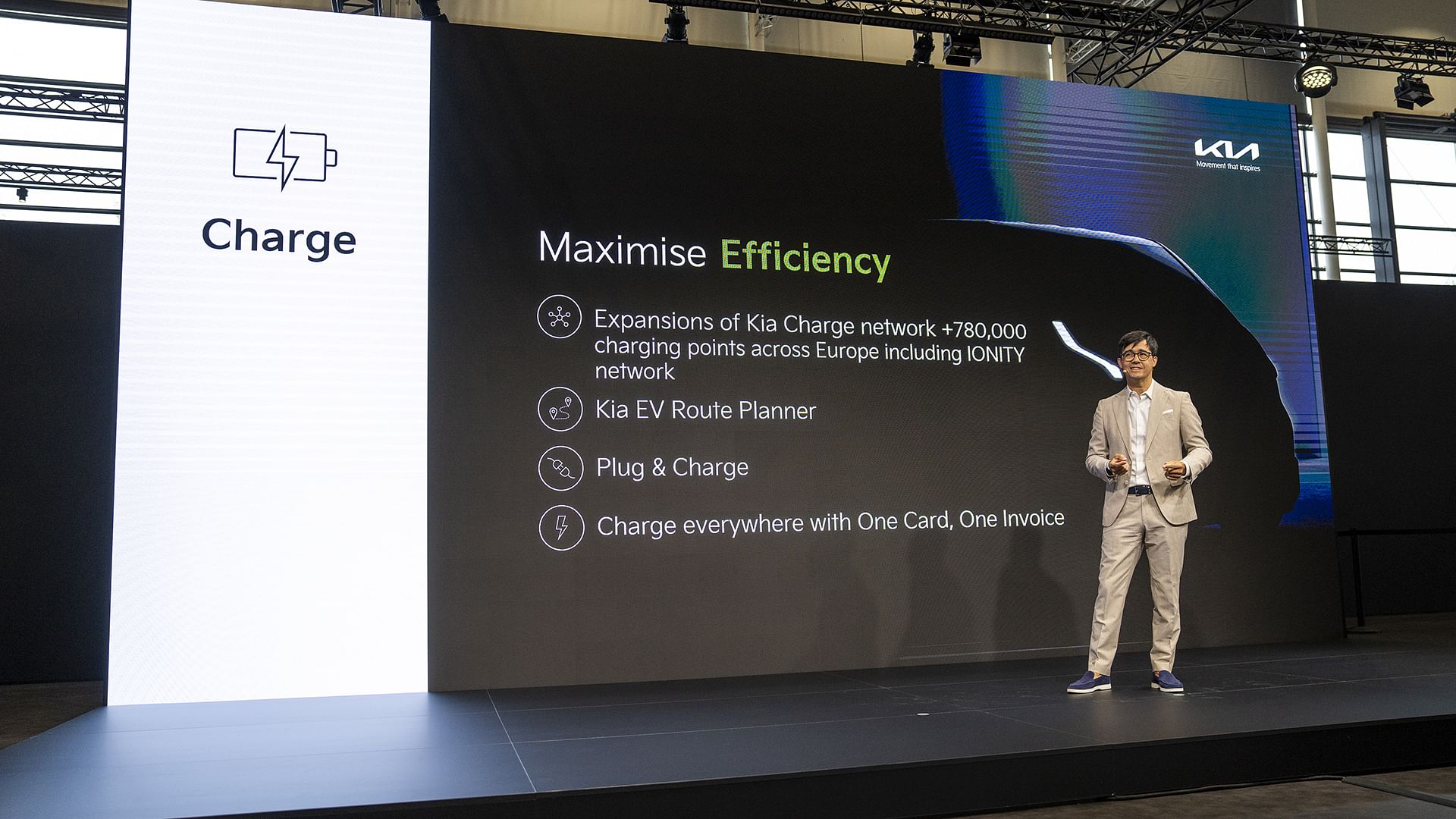Kia debuts electric PBV concepts at IAA 2024, looks to disrupt LCV market
BEV platform designed specifically to spawn LCVs that can be adapted to different wheelbase lengths and accommodate a wide range of vehicle sizes and body types.
Kia has held the European premiere of the brand’s new Platform Beyond Vehicle (PBV) concept at IAA Hanover. Kia aims to disrupt the light commercial vehicle (LCV) market with its range of purpose-built electric vehicles (EV).
PBVs feature superior cargo volume and best-in-class loading height, enabling customers to load more goods, maximise productivity and save time. Fully customer-centric and ideal for both B2B and private customers, Kia states that its PBVs “uniquely combine fit-for-purpose EVs with advanced software solutions, over-the-air updates and best-in-class dimensions and loading capacities.”
The PV5 concept, PV5 People Mover concept, PV5 High Roof concept and PV7 concept were on show at the Kia stand. The introduction of the production version is planned for summer 2025.
“In order to disrupt the LCV market, an all-in approach is needed to maximise the benefits of a dedicated platform for a wide range of customers,” said Marc Hedrich, President of Kia in Europe. “While this approach is not a first for electric passenger cars, it’s certainly the first time we see it for LCV. This is a benchmark moment, and our PBVs are set to deliver better accessibility, higher volumes, and lower running costs, to completely change logistics and mobility.”
Kia PBVs are part of the Korean automaker’s Plan S strategy, which includes expanding the line-up of electric vehicles. The PBV concept is built on four pillars – Drive, Charge, Connect and Work – with key news announced for each pillar at IAA Hanover, held 16-22 September 2024.

Built on innovative BEV platform
Kia has developed an innovative BEV platform specifically for LCVs that can be adapted to different wheelbase lengths, to easily accommodate a wide range of vehicle sizes and body types. With impressive handling, power and acceleration, PBVs ranging from small to mid-sized to large dimensions perform brilliantly on the open road and in urban areas. They feature best-in-class driveability and manoeuvrability, with a turning radius that makes it easy to park in tight spaces and move around in city centres.
At IAA Hanover, Kia announced that every PBV will be covered by a seven-year/150,000 km warranty. Customers can benefit from a user experience of the multi-tasking cockpit, AI-powered human-machine interface and multiple storage spaces. The cockpit is highly adaptable and can be easily turned into a mobile workspace when the vehicle is stationary.

Ultra-fast charging: 10% to 80% in less than 30 minutes
Kia PBVs will utilise the Kia Charge network that provides access to more than 780,000 charging points in 28 European countries. The IONITY network can also be used, with more than 4,100 charging points in 24 European countries. With ultra-fast charging, a PBV can charge from 10% to 80% in less than 30 minutes, enabling customers to charge the vehicle during a lunch break or while visiting a customer. Also, Kia PBVs will offer 22kW AC charging for better optimisation and lower costs, and fast charging of up to 150kW DC.
Supporting a streamlined charging process is Kia Plug & Charge, the one-step process with charging initiated by simply plugging in the charging cable. In addition, the Kia EV Route Planner finds the next available charging station and guides the vehicle straight there. Fleets can also take advantage of depot charging solutions, to charge a fleet of PBVs at the operator’s private hub or depot location.
Kia PBVs will also be V2L capable, making them mobile energy units able to power devices, tools, refrigeration units, emergency equipment and more. In the future customers can also exchange energy with the grid through the V2G ecosystem, to help optimise the vehicle’s total cost of ownership and contribute to sustainable electricity usage.
According to Kia, its PBVs will be the most flexible and technologically advanced LCVs available. At IAA Hanover, Kia announced it has joined forces with Geotab to drive the future of fleet management. This strategic collaboration will integrate a range of data solutions, with enhanced in-vehicle technology, innovative systems, route optimisation and safe driving rewards. Geotab is a global leader in connected transportation and asset management solutions.
As fully connected vehicles, Kia PBVs boast a range of onboard systems and features to maximise convenience. This includes a brand-new dedicated Android OS-based head unit, an AI-powered voice assistant, predictive maintenance, smart routing, and tailored fleet management system. Digital Key 2.0 provides remote and shared access to the vehicle, while over-the-air updates ensure the latest features and technologies are on board.
On a broader level, the live data generated during PBV operation can be used to analyse driving patterns, remotely identify issues, access vehicle commands, and manage fleets more efficiently than ever before. Access to the Android app market enables customers to add the apps they want to the vehicle. Additionally, Kia Connect will bring some well-thought customer solutions for PBV, optimised to enhance the user experience for their specific business needs.

Designed to maximise productivity
PBVs are highly adaptable vehicles available with different variants, seat layouts, dimensions, and conversions. They feature best-in-class cargo volume and loading height, to maximise productivity and minimise downtime.
Kia is already working with numerous partners, including pan-European converters, to develop individualised PBVs for specific needs, such as racking, refrigerated goods transportation, leisure, and wheelchair-accessible mobility.
At IAA Hanover, the brand announced a new technical collaboration with the Petit Forestier Group, the world-leading refrigerated vehicle company, for the development of the refrigerated version of the PBVs.
Kia is already cooperating with brands like Uber and has made initial deals with Coupang and CJ Logistics for deliveries, as well as Kakao Mobility and Dubai Taxi Corporation for ride-hailing.
RELATED ARTICLES
Autoliv Plans JV for Advanced Safety Electronics With China’s HSAE
The new joint venture, which is to be located strategically near Shanghai and close to several existing Autoliv sites in...
JLR to Restart Production Over a Month After September Hacking
Manufacturing operations at the Tata Group-owned British luxury car and SUV manufacturer were shut down following a cybe...
BYD UK Sales Jump 880% in September to 11,271 units
Sales record sets the UK apart as the largest international market for BYD outside of China for the first time. The Seal...






 By Autocar Professional Bureau
By Autocar Professional Bureau
 17 Sep 2024
17 Sep 2024
 5740 Views
5740 Views














 Ajit Dalvi
Ajit Dalvi




